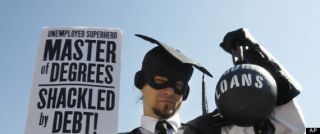Ethics and Morality
College Debt: Necessary Evil or Ponzi Scheme?
Today's college graduates are facing astronomical student loans. Is it worth it?
Posted January 28, 2013
A college education ranks right along with owning your own home as the foundation of the American dream. We learned the hard way that not everyone needed to own a house after the market collapse 2008, but as for a college degree, well we all know it’s necessary to be a success -- right? As it turns out, in this case and so many others, the ‘prevailing wisdom’ is often dead wrong.
Back in the day, a college diploma truly meant something. It represented an upward mobility and virtually guaranteed a decent job with benefits in a chosen field. Best of all it was cost effective; the return on a 4 year time/money investment was well worth it.
Then, once college became more common, it was no longer enough to get into college. It had to be a ‘good college’, or a ‘top 25 college’ or an Ivy league college. The better the school the better the job, and as with all supply and demand situations, the price for a top notch school skyrocketed. For example, when I attended Tulane University back in the 70’s tuition, room and board was about $2,500 per year. Today it’s over $60,000!
Of course, few people can afford that, but no problem. This is America! Simply take out a student loan, get in the best school you can and then make the mega bucks when you get out. But is this real?
The median household income between 2007-2011 was $52,762. The average tuition at a public four year college has increased 104 percent within the past ten years. Put into hard figures, during the 2010-11 academic school year, annual tuition, room and board at public colleges was $13,600; private, nonprofit universities cashed in at $36,300. Of course, the “better” the college, the higher the price tag.
The national student loan debt will reach $1 trillion this year. The higher education system as a whole is broken and with the price of the diploma climbing each semester, it's quickly becoming a race to nowhere.
What good is the diploma if you can't repay it? We are pumping out graduates who hold a degree in their chosen field.... yet can’t find work. Many who do are able to get lower paying jobs that are not in their field, but they must work in order to repay their school loans. What happens if you have a degree with an $80,000 student loan to repay, yet are unable to find a job? Fresh out of school and immediately facing financial disaster with a debt that will never be forgiven, even with bankruptcy -- now what?

The American dream promised our children that if they studied hard, made good grades and earned their degree they would be rewarded with success and opportunities that would otherwise not be available. In today's world that's a lie; there are no more guarantees. These students represent Generation Debt, without the benefits of previous generations with degrees. Remember, too, that this trillion dollar debt is everybody's debt if it’s not repaid.
Now, let's push money aside and look at another fact. Upper education used to open doors. Not so true anymore. The degree used to be a screening tool, but that is falling by the wayside as there are a glut of college grads on the market.
A slew of kids enter college without a clue as to what they want to do with their life. Many graduate with the same problem. They have their degree -- now what? It's not out of the ordinary for the guy with a Master's degree to be working side-by-side and earning the same wage as the guy next to him who earned his GED. The only difference is the GED guy doesn’t have to pay back a six figure student loan.
But there is an alternative for an education at a fraction of the cost. Trade schools (often overlooked and considered ‘not as good’ as a college education) are making a comeback. A 2011 Harvard Graduate School Of Education reports only 56 percent of students get their bachelor's degree within six years, and actually encourage high school teachers to persuade their students to consider trade school.
High school graduates are encouraged to look at these trade schools, quickly and efficiently learning and training to enter the workforce to keep up with hot careers. These vocational schools intensely teach the students what they need to land a job in today's booming fields -- healthcare, technology, electrical and natural resources -- with relevant career-focused subject matter.
These grads are armed with a certificate which requires considerably less time and classes than a degree, and often pays more. Not only that, but many vocational schools will actually find placement for you in the workforce. Some even guarantee it.
Universities used to prepare young adults for the real world. I dare say the graduates today go in without a clue and graduate without a clue. It's time to acknowledge the college degree is not worth what it was in the past. Times are changing, and so is the way we prepare our youth to survive in a competitive world.

Unfortunately, the drumbeat that ‘you MUST go to college’ shows no sign of abating, fostered by data that shows a lower unemployment rate for those with a degree. What this stat ignores is that those with the drive to make good grades, pass entrance exams and graduate are driven to succeed regardless of whether they have a degree or not. These people would be just as successful in the workforce without a degree, because they are hardworking achievers.
The college degree market today is comparable to a Ponzi scheme. Those that got in early reaped huge rewards and spread the mantra that you too can have it all if you just get your degree. But as more and more folks pursued the college dream at top flight universities, the prices kept ratcheting up to levels requiring huge loans to make the tuition. As with all pyramid schemes, those late to the party are the big losers.




